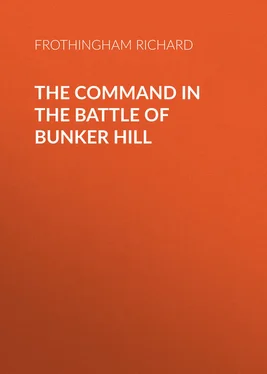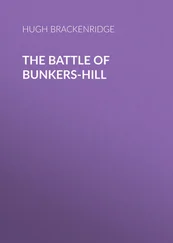Richard Frothingham - The Command in the Battle of Bunker Hill
Здесь есть возможность читать онлайн «Richard Frothingham - The Command in the Battle of Bunker Hill» — ознакомительный отрывок электронной книги совершенно бесплатно, а после прочтения отрывка купить полную версию. В некоторых случаях можно слушать аудио, скачать через торрент в формате fb2 и присутствует краткое содержание. Жанр: foreign_antique, foreign_prose, на английском языке. Описание произведения, (предисловие) а так же отзывы посетителей доступны на портале библиотеки ЛибКат.
- Название:The Command in the Battle of Bunker Hill
- Автор:
- Жанр:
- Год:неизвестен
- ISBN:нет данных
- Рейтинг книги:5 / 5. Голосов: 1
-
Избранное:Добавить в избранное
- Отзывы:
-
Ваша оценка:
- 100
- 1
- 2
- 3
- 4
- 5
The Command in the Battle of Bunker Hill: краткое содержание, описание и аннотация
Предлагаем к чтению аннотацию, описание, краткое содержание или предисловие (зависит от того, что написал сам автор книги «The Command in the Battle of Bunker Hill»). Если вы не нашли необходимую информацию о книге — напишите в комментариях, мы постараемся отыскать её.
The Command in the Battle of Bunker Hill — читать онлайн ознакомительный отрывок
Ниже представлен текст книги, разбитый по страницам. Система сохранения места последней прочитанной страницы, позволяет с удобством читать онлайн бесплатно книгу «The Command in the Battle of Bunker Hill», без необходимости каждый раз заново искать на чём Вы остановились. Поставьте закладку, и сможете в любой момент перейти на страницу, на которой закончили чтение.
Интервал:
Закладка:
A publication thus by one who has made the Bunker Hill battle his special study, who has written more on it than any one, and whose opinions, hence, carry with them a certain authority, seems to demand a reply. Silence, under such circumstances, might either be construed into an insult to an older inquirer, or as doing myself the injustice of admitting the correctness of his strictures. Besides, those to whom I feel so deeply indebted for criticism as gratifying as it was unlooked for, on a volume, which gradually and unexpectedly grew to the form in which it appeared, and who have thus kindly commended it to the public, have a right to expect, that, when its integrity is seriously impeached, its author should show his vindication. Still, I undertake a reply with the greatest repugnance to controversy. 1 1 Mr Swett, on the publication of the Siege of Boston, favored me with the following note, which, in another note written subsequently to the publication of his pamphlet, he informed me was intended for publication. Under the present circumstances I hope to be excused for printing it: — "Richard Frothingham, Jr., Esq., — My dear Sir: For your history of the Siege of Boston I am very much obliged to you. Without time to have read it critically, I find it a remarkable monument of diligent and successful research, candor, impartiality and judgment. It is a very valuable addition to history. The subject of Bunker Hill battle I thought I had exhausted thirty years ago, but your additional information is interesting and important. We differ on one point only I believe worth mentioning, and that important only as a matter of curiosity, the commander in the battle, which we may discuss hereafter. With friendly regard and respect, With friendly regard and respect, S. Swett."
In doing it, and doing it after all, mainly for the sake of history, what is merely personal will be set aside as of little account. It is not of so much consequence to the public how a writer carries his head, whether sometimes under his arm or always above his shoulders, as it is how he does his work. Besides, discourteous personal allusions do not strengthen a weak cause, and are sure to mar a strong one.
It is difficult to observe method in dealing with this medley of accusation. Mr Swett's zeal for his hero is so ardent, and his imagination is so brisk, that he seems to have misapprehended the simplest language; and hence, quite unintentionally it may be, he ascribes to me views I do not express, facts I do not state, and opinions I do not hold. He is merry over mistakes that have not been committed, and is indignant at charges that have not been made. Where, for instance, in the Siege of Boston, is it written that the "great battle of Bunker Hill was fought on our side by a headless mob?" Where do I say that it is difficult to assign a "motive" for this conflict? Where is adduced "the most incontrovertible argument in the world," or is it even stated, that the army at Cambridge was "itself a mob?" What "mistake of law" is made where it is said that Warren had not received his commission? What charge is made against Col. Sargent? Where is it stated or intimated that General Putnam was "a mere volunteer" in the army at Cambridge? Where is it said that "he could not possibly" command at Bunker Hill, because it was an army of allies? Where is the sentence which reads that, had he been the commander, he would have "boasted of it," or have "publicly claimed" it? Where is that "large portion" which contains the attempt to prove that "General Putnam had no right to command Col. Prescott?" These allusions, and they might be increased, are to instances where the meaning has been misstated. Mr Swett does not quote the language he comments on, and I prefer to be judged by what is written rather than by what he says is written. Besides all this, and considerable attempts at ridicule, Mr Swett makes the serious allegations that I have been "grossly regardless of known facts," and have even "manufactured" history! Though age, among its privileges, cannot claim exemption from rebuke for such injustice, yet I deeply regret the occasion which requires controversy with one, relative to whom I had felt only respect, exchanged only courtesies, and written only commendation.
Before going to the question of command, it may be well to examine some of the errors which Mr Swett alleges the History of the Siege of Boston contains.
1. On page 166 it is related that "when General Warren entered the redoubt Colonel Prescott tendered him the command; but Warren replied that he had not received his commission, and should serve as a volunteer." Mr Swett remarks on this as "Frothingham's mistake in supposing that Warren told Prescott, as a reason for not assuming the command, that he had not received his commission. This is a mistake of fact and law; Warren, according to General Heath, said not one word about his commission, and his want of one did not diminish his rights of office – a point that has been settled by the Supreme Court of the United States," p. 7. Mr Swett does not quote my language, and the reader cannot find any such "mistake of law " as he comments on in the Siege of Boston. This "point," therefore, need not be discussed. Now for the mistake of fact . Mr Swett had before him, when preparing his pamphlet, President Sparks's MS. copy of Judge Prescott's memoir of the battle, and knew this was my authority for the anecdote. But what does he mean? Who would expect, after such a charge, to find on page 32 of Mr Swett's own history , the following account of what took place when Warren entered the redoubt: – "Prescott offered him the command; but he had not yet received his commission , and tendered his services to the colonel as a volunteer!" And Mr Swett says that he got this conversation from Colonel Putnam and Dr Jeffries. After three editions of his history has he concluded that he mistook those gentlemen? Does he mean to ignore his own authorities? If so, the fact must not be given up, for Judge Prescott states it as from his father, and it harmonizes with the records relative to Dr Warren's appointment, as will be seen in another place. Is this the way my narrative is to be pronounced incorrect and then ridiculed? As Mr Swett makes himself merry at what he calls my mistakes, he remarks – "He sometimes, like St. Patrick, carries his head under his arm instead of wearing it on his shoulders," p. 13. We know it is said that St. Denis carried his head in his hands , and that the Anthropophagi had heads, but it would seem that St. Patrick's head must have been right when he did his great work for Ireland. Letting this pass – how was Mr Swett's head located when it worked out this double " mistake of fact and law ?"
Читать дальшеИнтервал:
Закладка:
Похожие книги на «The Command in the Battle of Bunker Hill»
Представляем Вашему вниманию похожие книги на «The Command in the Battle of Bunker Hill» списком для выбора. Мы отобрали схожую по названию и смыслу литературу в надежде предоставить читателям больше вариантов отыскать новые, интересные, ещё непрочитанные произведения.
Обсуждение, отзывы о книге «The Command in the Battle of Bunker Hill» и просто собственные мнения читателей. Оставьте ваши комментарии, напишите, что Вы думаете о произведении, его смысле или главных героях. Укажите что конкретно понравилось, а что нет, и почему Вы так считаете.












